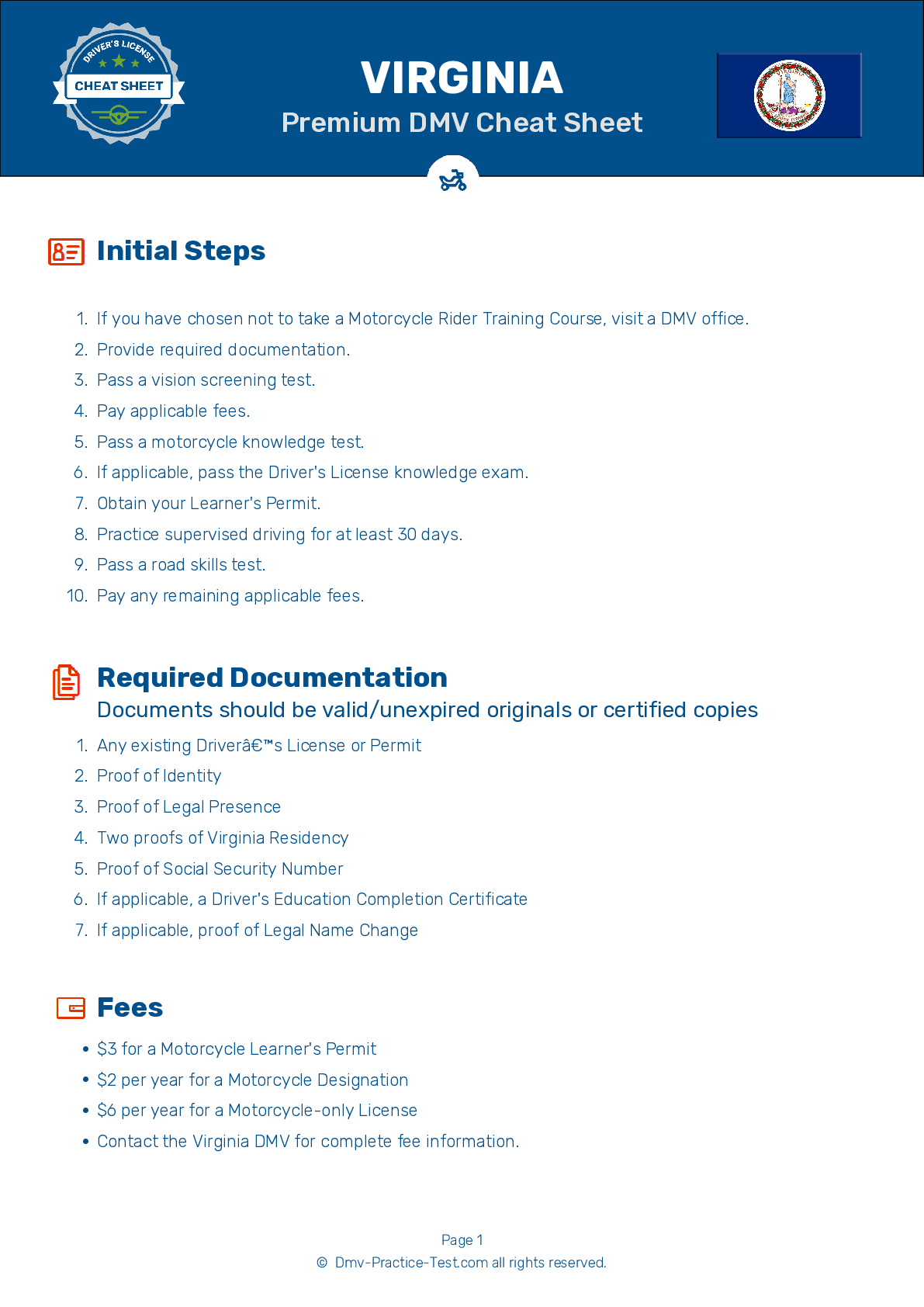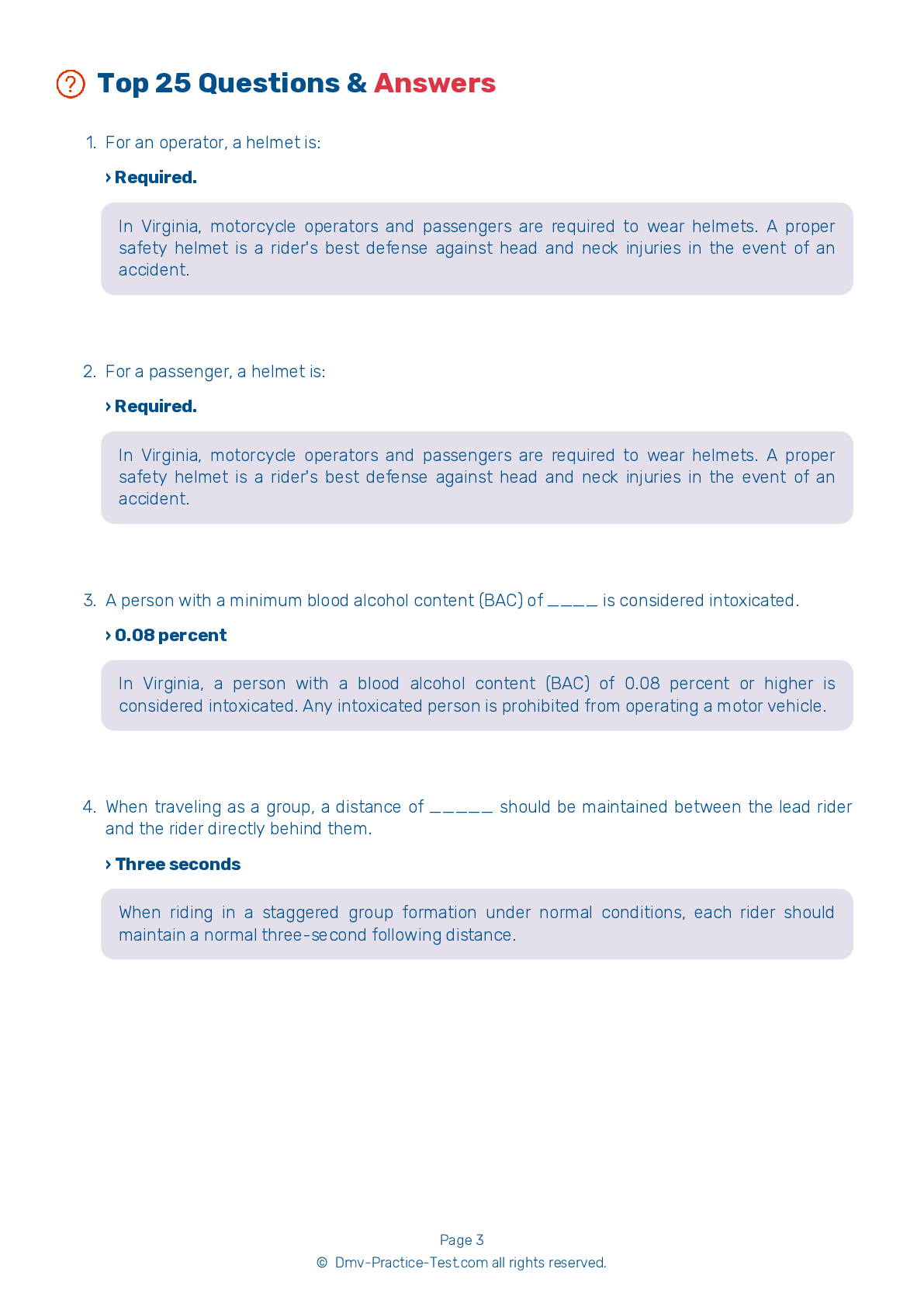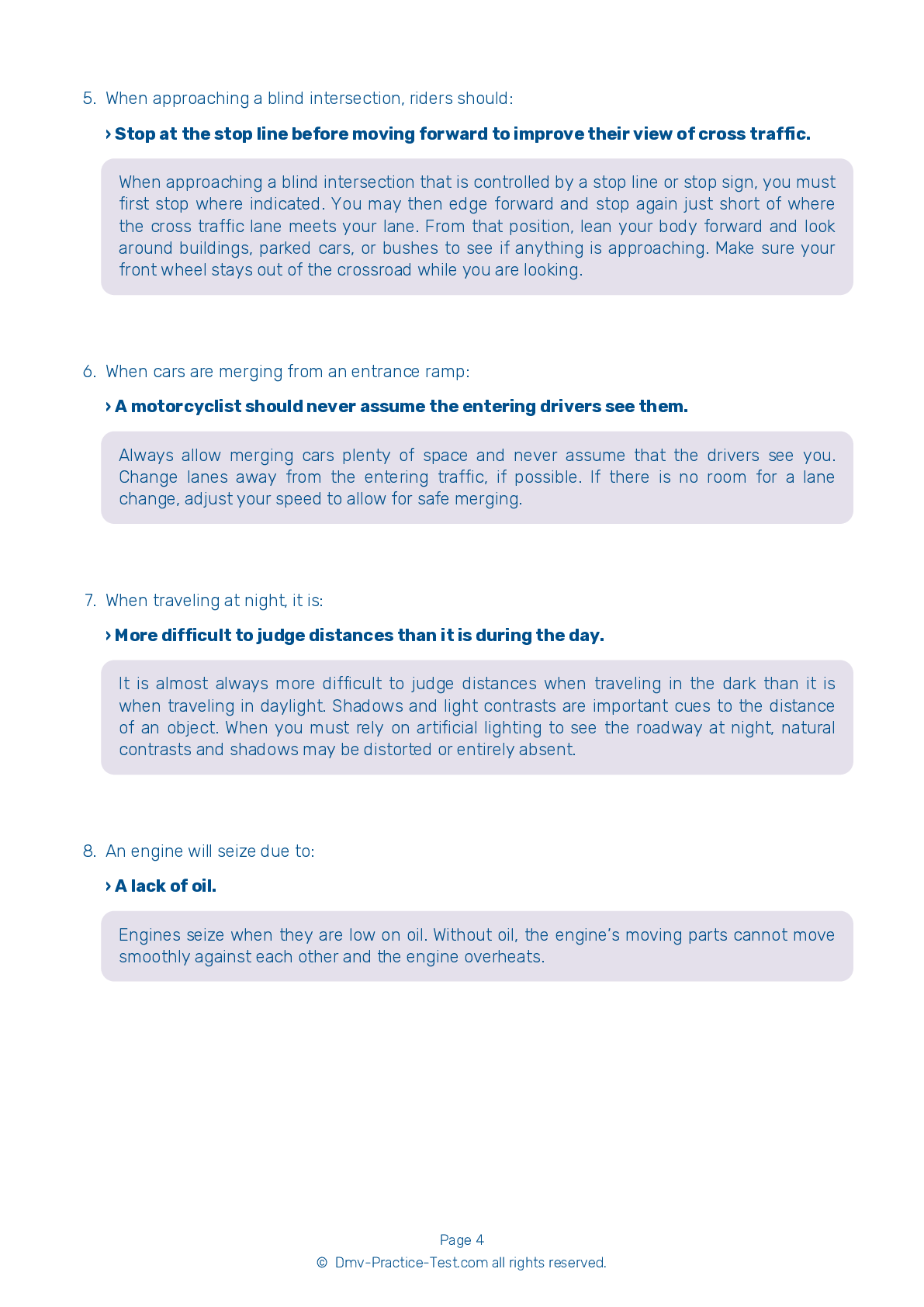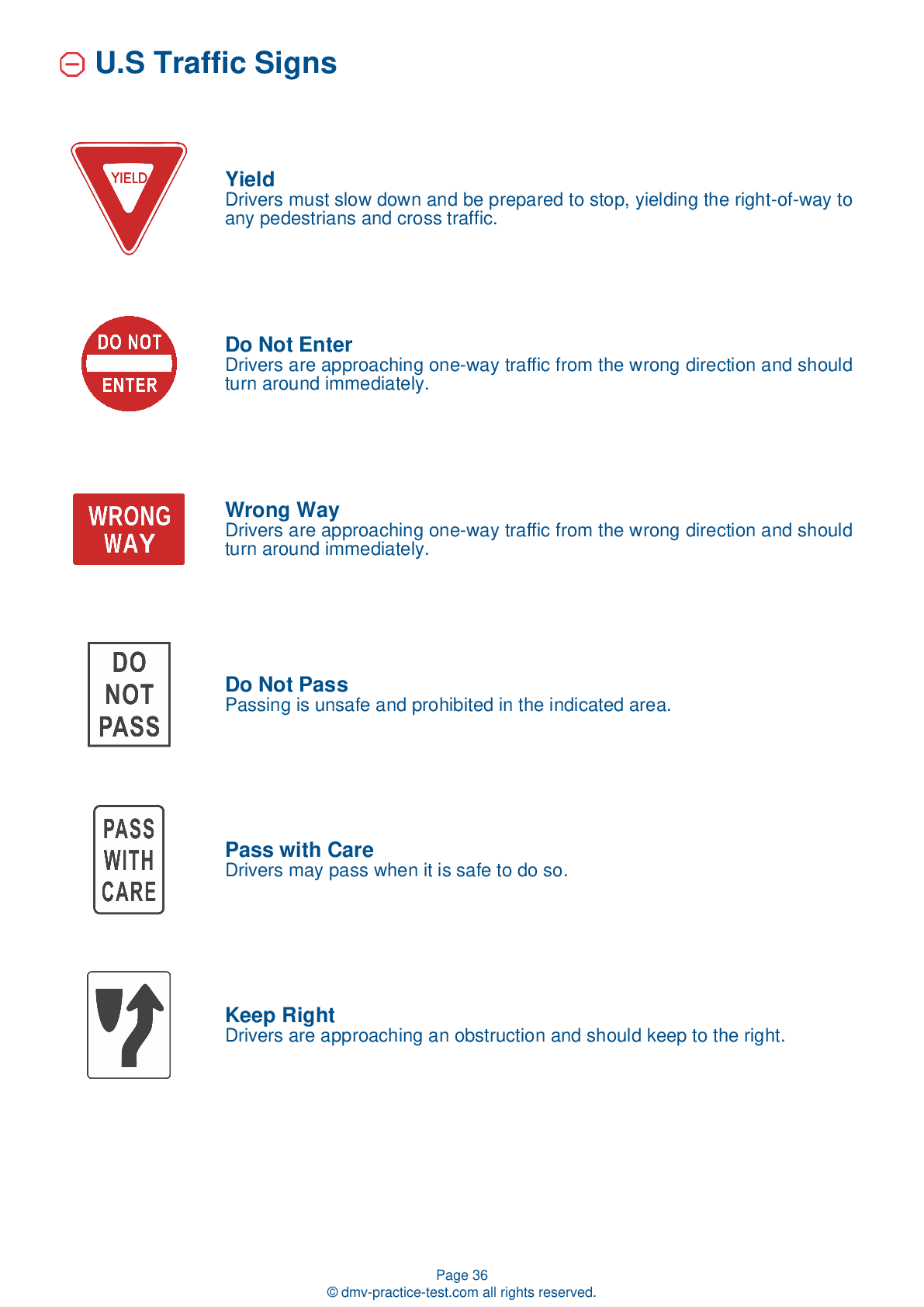DMV Permit Test #13
Motorcycle Test | License VA 2026 | FREE Online Practice! #13 Page 2 of 5
Take this FREE motorcycle test (license in VA 2026) to check your knowledge of the road rules. To improve your results, download a motorcycle handbook online, study theory, and practice for free on our website. Still worried about how to get a motorcycle license in Virginia in 2026? Check our website for more sample tests, train as much as possible, and boost your grades!
25
20
16
6 . When being passed by another vehicle, motorcyclists should be alert to:
When being passed, motorcyclists should be careful not to be hit by any part of the passing vehicle, including its mirrors. In addition to the vehicle itself, motorcyclists should also be aware of wind gusts coming from the passing vehicle and potential objects being thrown by a passenger in the vehicle who may not be paying attention to the road.
7 . When it starts to rain, the safest lane position for a motorcycle is:
Oily deposits from cars collect in the center strip of the road. While there is usually enough traction to ride in this area, it can become especially dangerous when it starts to rain. Instead, ride in the tire tracks left by cars; the left track will often be the safest.
8 . Riding on ______ may provide poor traction.
Traction may be poor on surfaces such as wet, snowy, icy, or muddy pavement; gravel roads; lane markings; and steel plates and utility hole covers.
9 . You have an improved chance of avoiding serious injury in a crash if you wear:
Wearing a helmet is your best defense against injury while riding a motorcycle. Wearing a plastic, shatter-resistant face shield can help protect your face from injury in a crash.
10 . Use your mirrors when stopping at an intersection:
It is important to consistently check vehicles approaching your motorcycle from behind to determine if drivers are paying attention to you and your movements. Use your mirrors when stopping at an intersection to make sure approaching drivers are responding appropriately to your actions.
Need Motorcycle Insurance? No problem!
Compare the best rates in Virginia and find a personalized policy that meets your needs.
1. Are You Currently insured ?
2. Married ?
3. Do you own your Home?
4. Have you or a Family Member Honorably Served in U.S. Military ?
5. Your Name
6. Age
7. Zip code
Ranked by best match
2026 Virginia | Frequently Asked Questions
To acquire a motorcycle license in Virginia, you must first apply for a motorcycle learner's permit. After holding the permit for a minimum of 30 days, you can take the motorcycle road skills test. Passing this test, along with a vision screening and knowledge exam, will qualify you for a Virginia motorcycle license.
In Virginia, the minimum age to obtain a motorcycle driver's license is 16 years and 3 months. However, if you are under 18 years old, you must also complete a state-approved motorcycle rider training program and have your parent or guardian's consent.
Yes, in Virginia, you need a dedicated license for motorcycle riding. You can either add a motorcycle endorsement (Class M) to your existing driver's license or obtain a separate motorcycle license if you don't have a standard driver's license. Both require passing a knowledge exam, skills test, and vision screening.
To apply for a motorcycle license in Virginia, you need to provide proof of identity, legal presence in the US, Virginia residency, and Social Security number. This can include documents like a birth certificate, passport, utility bill, bank statement, or Social Security card. If you're under 19, you'll also need proof of completing a driver education program.
Yes, you will need to take a written exam for a motorcycle license in Virginia. The test covers topics like traffic laws, safe riding techniques, and how to handle hazardous conditions. It's designed to assess your understanding of operating a motorcycle safely. This is a mandatory requirement regardless of whether you've completed a rider training course.
The motorcycle written test in Virginia covers a variety of topics related to motorcycle operation and safety. This includes understanding road signs and signals, rules of the road, safe riding techniques, how to handle hazardous conditions, and motorcycle-specific laws. The questions are based on information provided in the Virginia Motorcycle Operator Manual.
Yes, in Virginia, successful completion of a Virginia Rider Training Program Basic Rider Course can substitute for both the knowledge and skills tests required for a motorcycle license. The course includes classroom instruction and hands-on motorcycle training. Upon completion, you'll receive a certificate that you can present at the DMV within 30 days to waive the tests.
Enrolling in a Virginia Rider Training Program involves finding a program location near you, contacting them directly, and signing up for a course that fits your schedule. These courses typically have a fee. They offer both basic and advanced rider courses, which include classroom instruction and hands-on training. Completion of these courses may waive the DMV's motorcycle skills test requirement.
No, you don't need to own a motorcycle to take the license test in Virginia. However, the motorcycle you use must be legally registered, insured, and pass a safety inspection. You also need to have written permission from the owner if it's not your motorcycle. Always remember to wear a helmet and eye protection.
Yes, you can use a friend's motorcycle for the driver's license evaluation in Virginia. However, the motorcycle must be properly registered, insured, and pass a safety inspection. Also, you should have written permission from the owner if the examiner asks for it. Remember to wear a helmet and eye protection as required by Virginia law.
Yes, in Virginia, the motorcycle driving exam tests specific handling skills. These include the ability to start and stop, turn and swerve, and navigate through intersections. Riders are also tested on their ability to make quick stops and evasive moves. The test ensures riders understand and can execute safe motorcycle operation practices.
Yes, Virginia imposes certain restrictions on new motorcycle drivers under the age of 19. They must hold a motorcycle learner's permit for at least nine months before they can apply for a license. During this period, they are not allowed to carry passengers, and they must only ride during daylight hours.
Yes, your Virginia driver's license with a motorcycle endorsement allows you to legally operate a motorcycle in other states. However, it's essential to familiarize yourself with the specific motorcycle laws and regulations of the states you plan to visit, as they may differ from those in Virginia.
Yes, in Virginia, it's mandatory for all motorcycle riders and passengers to wear a helmet that meets the standards set by the Snell Memorial Foundation, the American National Standards Institute, or the Federal Department of Transportation. This law is in place to ensure safety and minimize injuries in case of an accident.
In Virginia, there's primarily one type of motorcycle license, known as the "M" class license. However, there are different endorsements and restrictions that can be added to the license based on the rider's qualifications and the type of motorcycle they will be operating. It's always best to check with the Virginia Department of Motor Vehicles for specific information.
Yes, you can add supplementary endorsements to your motorcycle license in Virginia. These endorsements, such as for operating different classes of motorcycles or commercial vehicles, can be obtained after passing additional written and skills tests. Remember to check with the Virginia DMV for specific requirements and procedures for each endorsement.
Yes, the Virginia Department of Motor Vehicles (DMV) offers the motorcycle license test in multiple languages. However, it's advisable to contact your local DMV office in advance to confirm the availability of the test in your preferred language. Remember, you must be able to understand road signs and directions in English to safely operate a motorcycle.
An effective strategy to prepare for the motorcycle license test includes studying the Virginia Motorcycle Operator Manual thoroughly, understanding traffic signs and rules, practicing riding skills, and taking online practice tests. It's also helpful to familiarize yourself with the format of the test, and take adequate rest before the actual exam day.
Yes, the Virginia Department of Motor Vehicles (DMV) offers the motorcycle written exam in several languages other than English. These include Spanish, Korean, Vietnamese, and more. It's important to check with your local DMV office for available languages. Additionally, the use of an approved translator is allowed if your preferred language is not offered.
Yes, retaking is allowed if you fail the motorcycle written test in Virginia. However, you must wait at least 15 days before you can attempt the test again. It's recommended to review the Virginia Motorcycle Operator Manual during this period to improve your knowledge and increase your chances of passing on the next attempt.



